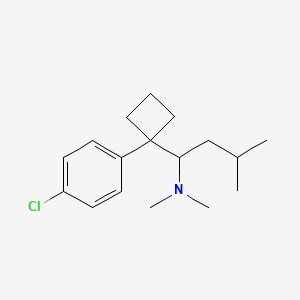Attribution Statement: LactMed is a registered trademark of the U.S. Department of Health and Human Services.
NCBI Bookshelf. A service of the National Library of Medicine, National Institutes of Health.
Drugs and Lactation Database (LactMed®) [Internet]. Bethesda (MD): National Institute of Child Health and Human Development; 2006-.
CASRN: 106650-56-0

Drug Levels and Effects
Summary of Use during Lactation
Sibutramine is no longer marketed in the United States. Because there is no published experience with sibutramine during breastfeeding, an alternate therapy may be preferred, especially while nursing a newborn or preterm infant. Information on the effect of sibutramine on serum prolactin is somewhat conflicting.
Drug Levels
Maternal Levels. Relevant published information was not found as of the revision date.
Infant Levels. Relevant published information was not found as of the revision date.
Effects in Breastfed Infants
Relevant published information was not found as of the revision date.
Effects on Lactation and Breastmilk
In a study of hypocaloric diet plus sibutramine in overweight and obese patients with polycystic ovary syndrome, no change was seen in serum prolactin levels over the 6-month study period.[1]
A woman developed amenorrhea-galactorrhea syndrome shortly after starting therapy with sibutramine for weight loss. Her serum prolactin was elevated, but returned to normal within 15 days of discontinuing sibutramine. It remained in the normal range during the 180-day follow-up period.[2]
The prolactin level in a mother with established lactation may not affect her ability to breastfeed.
References
- 1.
- Florakis D, Diamanti-Kandarakis E, Katsikis I, et al. Effect of hypocaloric diet plus sibutramine treatment on hormonal and metabolic features in overweight and obese women with polycystic ovary syndrome: A randomized, 24-week study. Int J Obes (Lond). 2008;32:692–9. [PubMed: 18071341]
- 2.
- Soares Leaes CG, Pereira-Lima JF, da Costa Oliveira M. A case of sibutramine-induced hyperprolactinemia. Neuro Endocrinol Lett. 2011;32:616–8. [PubMed: 22167128]
Substance Identification
Substance Name
Sibutramine
CAS Registry Number
106650-56-0
Disclaimer: Information presented in this database is not meant as a substitute for professional judgment. You should consult your healthcare provider for breastfeeding advice related to your particular situation. The U.S. government does not warrant or assume any liability or responsibility for the accuracy or completeness of the information on this Site.
- User and Medical Advice Disclaimer
- Drugs and Lactation Database (LactMed) - Record Format
- LactMed - Database Creation and Peer Review Process
- Fact Sheet. Drugs and Lactation Database (LactMed)
- Drugs and Lactation Database (LactMed) - Glossary
- LactMed Selected References
- Drugs and Lactation Database (LactMed) - About Dietary Supplements
- Breastfeeding Links
- PubChem SubstanceRelated PubChem Substances
- PubMedLinks to PubMed
- Review Triazolam.[Drugs and Lactation Database (...]Review Triazolam.. Drugs and Lactation Database (LactMed®). 2006
- Review Methamphetamine.[Drugs and Lactation Database (...]Review Methamphetamine.. Drugs and Lactation Database (LactMed®). 2006
- Review Butabarbital.[Drugs and Lactation Database (...]Review Butabarbital.. Drugs and Lactation Database (LactMed®). 2006
- Review Pramipexole.[Drugs and Lactation Database (...]Review Pramipexole.. Drugs and Lactation Database (LactMed®). 2006
- Review Leflunomide.[Drugs and Lactation Database (...]Review Leflunomide.. Drugs and Lactation Database (LactMed®). 2006
- Sibutramine - Drugs and Lactation Database (LactMed®)Sibutramine - Drugs and Lactation Database (LactMed®)
Your browsing activity is empty.
Activity recording is turned off.
See more...
